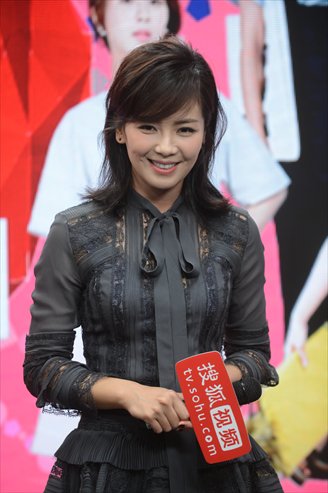TV drama ‘Ode to Joy’ sparks discussion about changing values

Wang Ziwen Photo: IC

Liu Tao Photo: IC

Qiao Xin Photo: IC

Yang Zi Photo: IC

Ode to Joy director Hou Hongliang Photo: IC
While fantasy and period dramas like The Journey of Flower and Nirvana in Fire captured a nationwide craze in 2015, this year's new hit is a much more down-to-earth work - urban drama Ode to Joy.
The show, which ended its first season Tuesday night, started with an viewership rate of 0.49 percent, ranking No.12 in its time slot, but soon climbed to the top with a viewership rate of 1.92 percent. Also streaming on online platforms such as Sohu TV and iQiyi, the series had earned more than 300 million views by mid-April.
Despite its popularity the show has drawn some critics. Some have criticized the show as encouraging the worship of wealth and leading audiences to become immersed in a world of pure illusion.
One thing most people have tended to agree on is that Ode to Joy reflects the current mindset and lives of China's urban middle class, which has undergone some major changes over the years.
Holding up a mirror
Based in Shanghai, Ode to Joy focuses on the stories of five young women in their mid-20s and early 30s who, while coming from different social and educational backgrounds, all want to succeed in the big city in both romance and their careers.
Twenty-three-year-old Qiu Yingying (Yang Zi), for example, comes from a small city but was pressured by her parents to move to Shanghai because of the possibility of better opportunities. A newbie in a small company, Qiu is very simple-minded. Best friend to Qiu is 22-year-old Guan Ju'er (Qiao Xin), an intern at a global top 500 company. Since she didn't graduate from a famous university, Guan is constantly nervous and stressed by the race to get ahead in the company. Sharing the same rented apartment with the two is Fan Shengmei (Jiang Xin), 30, a senior HR employee in a foreign company. Having worked in the big city for years, Fan is kind-hearted but has grown comfortable with urban life and wants to marry a rich man.
Their neighbor is Andy (Liu Tao), an overseas returnee who has come back to China to be the CFO of a major company. Smart as she is, Andy is not good at dealing with relationships and her lonely childhood and battle with a hereditary disease fill her life with worry.
Rounding out the cast is another neighbor, Qu Xiaoxiao (Wang Ziwen), who was born to a wealthy family. Having spent her life idling her days away both at home and abroad, Qu has decided to start her own business so that she can inherit her father's enterprise that might otherwise be handed down to her step-brother.
"The reason why Ode to Joy has become a favorite is not only due to its high production quality, but also because its core story is close to reality," an article on mt.sohu.com said, going on to explain that the show reveals the hardships that exist underneath the surface of shiny metro life, while also exploring different social rungs.
Although they may not be living in Shanghai, many viewers have empathized with at least some parts of the characters' lives and dreams.
Xu Feiyue, for example, lives in a third-tier city neighboring Shanghai. Xu said she sees a little of herself in the different characters.
"I've run into similar family troubles like Fan, but at work, I am more like Guan," Xu told the Global Times.
Ma Yunfei, 27, currently works in Nanjing, the capital of Jiangsu Province, and is a huge fan of the show. "Rather than having any one character being similar to you, it feels more like your characteristics have been spread out among the different characters," he said.
"Everyone has been pure like Qiu, obedient like Guan, or wished for success like Andy or freedom like Qu at one point in their lives. And there is no escaping Fan's vanity."
A domestic TV drama that takes pains to reflect reality instead of presenting some beautiful dream world has been a rarity in China in recent years. With the rise in popularity of South Korean dramas, many domestic shows have followed the same fairy tale model.
On Sina Weibo, well-known microblog Yule Ziben Lun pointed out how Ode to Joy breaks from the cookie-cutter nature of recent TV dramas, especially South Korean shows, that often feature a pure and kind-hearted Cinderella-like figure that earns the love of a handsome and wealthy man by the end of the series.
"But it goes the complete opposite way," the post pointed out.
"The handsome, rich and qualified men in the drama do not love Cinderella but the highly intelligent and skilled elites like Andy… while the one who does chase after Cinderella is a jerk."
Practicality over idealism
The popularity of Ode to Joy is similar to Struggle, a similarly themed TV drama that aired in 2007.
The show was also praised for its realistic portrayal of life. Looking at the two shows, its easy to see how Chinese middle class values have changed over the years.
The lead role of Lu Tao in Struggle, for instance, believes that success comes from hard work. Even after he gains an unexpected inheritance from his father and later deals with a failed business venture, the gain or loss of millions of yuan is not what's important to him.
The way romance is portrayed is different as well. The on again, off again love story of characters Yang Xiaoyuan and Xiang Nan show what people thought of romance back then. When the two were deep in love they stole documents in order to register for marriage, but divorce once they started encountering some troubles. In the end though, they got back together when they realized they still had feelings for each other. It's a story of love conquers all. Struggle displays the idealism of its time. Yet now, about a decade later, values have changed. Economic factors play a more important role in people's lives.
Economic prosperity plays a very important role in the lives of the characters in Ode to Joy. For example, what brand someone wears or what car they drive are often used to determine a person's value. One scene shows how Fan changed her handbag to a famous brand after she finds out that the wealthy Qu is going to the same party so that she can at least appear to be on the same financial level as her.
As for romance, the characters in Ode to Joy are much more practical, self protective and less trustful of each other. Fan teaches her younger roommates that pure romance is worthless and that material factors should be a concern in a relationship.
Although we may not want to admit it, China's middle class has become more conservative and practical, and less romantic and brave when it comes to following their heart.
Newspaper headline: China’s new middle class